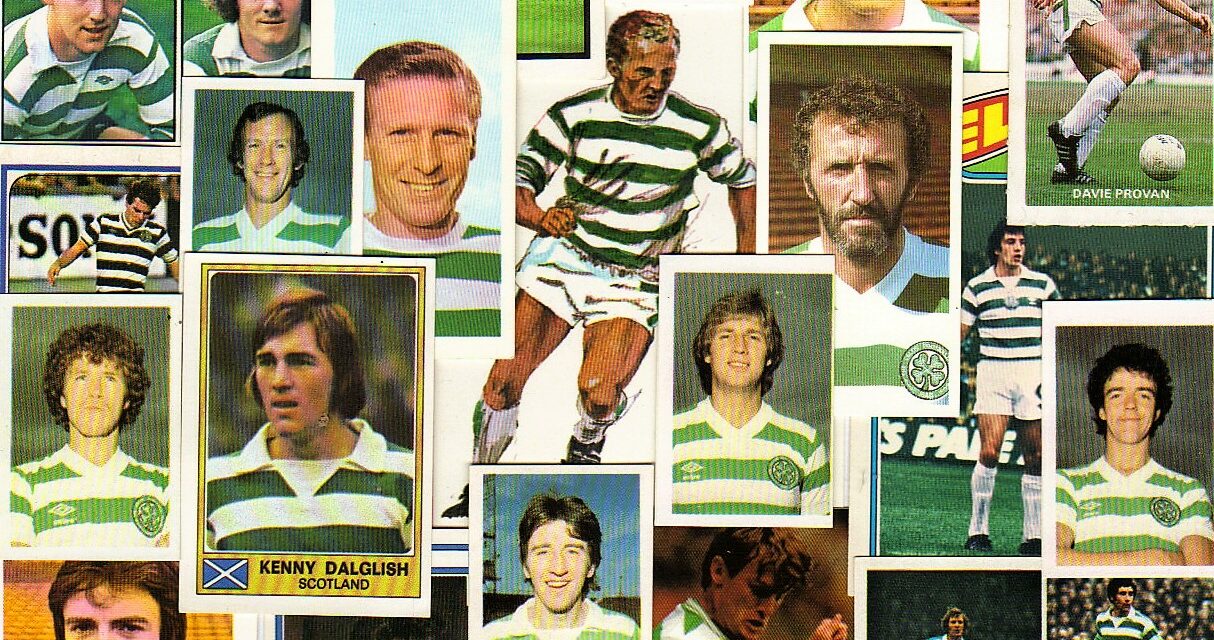St Anthony completes the second part of his top 10 of Celtic players he has seen since 1972. Just a reminder that he is only choosing players from which he saw the majority of their careers at Parkhead so this excludes the Lisbon Lions.
5. Lubo Moravcik
Few of us can forget the media response to Lubo Moravcik signing for Celtic in November 1998. The 32 year old Slovakian was viewed by the press as washed up and a desperate signing by Celtic. Yet from his first game onwards, Lubo should a level of skill seldom seen in Scotland before or since. Two footed, able to play in virtually any position in midfield or attack, he was sensational and gave Celtic fans some of their finest moments. The only regret is that Celtic never got to sign Lubo sooner when he would have been at his peak. That’s some prospect because he was outstanding in his mid-30’s what would he have been like in his late 20’s? Sometimes a player can find his spiritual home. I always felt that Lubo found his spiritual home at Parkhead amongst the Celtic supporters. He entertained the fans royally and the supporters inspired him to great performances. Lubo would undoubtedly be higher on this list if he had arrived at Celtic sooner. It remains a regret that we did not have him in Seville in 2003 when the outcome could have been very different.
4. Paul McStay
Very often a young boy playing his early games in senior football will need a bedding in period. Paul McStay walked into a Celtic side in 1982, full of strong personalities, and never once looked out of place. He looked like a youngster but played with the assurance of a veteran. For the next 15 years he was Celtic’s guiding light in midfield and one for the purists. Blessed with great control and passing ability but also in possession of a ferocious shot when required. The early years from 1982 to 1988 were very successful and Paul’s name will always be synonymous with Celtic’s centenary double in 1987-88 in which he had an exceptional season. However, as the club faded in the 1990’s Paul became something of a guiding light, adored by the fans, in an era of footballing darkness. Truly great players achieve a level of consistency which ordinary players cannot aspire to. Some players are undoubtedly talented but can be mercurial, up one week down the next. Paul achieved a level of consistency in his game which few Celtic players can match. The fans referred to him as ‘The Maestro’ and due to his faithful devotion to Celtic, particularly during the mediocre years, Paul is still held in the highest regard by Celtic fans to this day. Coming from the great McStay family tradition, Paul was born to play for Celtic.
3. Kenny Dalglish
As an impressionable boy, watching Kenny Dalglish play in the 1970’s, was an absolute delight. I often make the point there was a Roy of the Rovers element to Kenny’s game. Week after week, it seemed as if he would bail Celtic out with a special goal or some other fine piece of play. It wasn’t just that he was a great goal scorer but he was a scorer of great goals. Spectacular efforts which could almost burst a net. He deserves great credit also for his versatility. English fans are often shocked that Kenny played many of his games for Celtic in a midfield role whereas he was known at Liverpool in later years as an out and out striker. He was the best shielder of a ball you will ever see and Celtic fans of the 1970’s vintage will tell you that he carried the Celtic team on his back for seasons in the post-nine in a row era. Kenny shared his joy with the fans when he scored a goal. The image remains of him running towards the Jungle with arms outstretched and that huge smile which brightened many a dull Saturday afternoon. My worst moment as a Celtic fan is no game of football. Games come and go. When Kenny left Celtic in 1977 it was described as alike to a death in a family. There was huge trauma and it took Celtic a long time to recover from his departure, me in particular. His success at Liverpool tends to overshadow his contribution to Celtic. We genuinely believed Kenny was the best player in Britain on the mid 1970’s. Such a shame he had to go down south to prove this was actually the case.
2. Henrik Larsson
Few of us who saw Henrik Larsson’s debut at Easter Road in 1997 could have imagined the impact he was to have on Celtic and their supporters for the next seven years. He was already a hero in his initial season, courtesy of the 19 goals which helped Celtic to the League and League Cup double, particularly the goal against St Johnstone at Parkhead on that nerve ridden last game when the League was won in May 1998. Henrik often played behind the striker in that initial season, but Jo Venglos deserves great credit for pushing him forward to be the main Celtic striker from November 1998 onwards, and Henrik’s Celtic career absolutely began to flourish. Henrik had great attributes. He made intelligent runs into space, could shield a ball with back to goal, and for a relatively small man, he had incredible timing and power in the air. Henrik rarely scored a glancing header. When he connected in the air the ball was bulleted goal-wards. Like all the truly great players, Henrik had a physical side to him and was not easily intimidated. His partnership with Chris Sutton from 2000 was a joy to behold and he could change his game when playing with the likes of John Hartson, where Henrik became more of a provider. Celtic historians used to look back in awe at the great McGrory’s stats as a goal scorer. In 2000-01 Henrik scored an astonishing 53 goals in 51 competitive games. It’s difficult to imagine these figures ever being repeated. He was an outstanding performer at Champions League, European Championship, and World Cup, a genuine world class player. We were in the presence of greatness and we knew it at that time. Henrik was at his playing peak at Parkhead, aged 25 to 32, and that should be remembered. He could have moved anywhere in the world during that time but gave his best years to Celtic for which he will always be revered.
1. Danny McGrain
It’s been a difficult choice, but Numero Uno for me is the incomparable Daniel Fergus McGrain. From 1973 to 1977, Danny was rated as the best full back in European football, if not on the planet. There is still great sadness that an ankle injury kept him out of the 1978 World Cup in Argentina where he would only have surely have cemented his reputation, the South Americans raving about him from Scotland’s tour in 1977 when they played Brazil, Argentina, and Chile. Danny was capable of playing on both sides at full back and he was the only player who I recall could actually run a game from the right back position and was, in essence, an auxiliary midfield player. He had a superb first touch, was a tremendous passer, and was very intelligent in linking up with like-minded players such as Dalglish, Nicholas, and McStay. It was actually amusing to see opposition teams line up with their wingers marking Danny to block his exhilarating runs down the right flank, rather than Danny marking the winger. After his injury in 1979 he led Celtic to that greatest of games, when 10 men won the league against Rangers in May 1979, in the legendary 4-2 success. In later years he altered his game slightly but never dropped below the high standards he had set himself. Even in the autumn of his Celtic years he was an inspiration. There were two games against Rangers (2-0 January 1986 and 3-1 April 1987) in which Danny received the plaudits as man of the match at the age of 35 and 36, respectively. This showed Danny’s great pride in his performance, even later in his career. McGrain was Celtic’s captain and leader on the pitch, a talisman. When Danny played, you felt secure that Celtic would do well, When Danny was missing, it was often a struggle. To this day, Danny is revered by a generation of Celtic fans. When others left for English riches, Danny stayed faithful to the Celtic cause and was deservedly rewarded with a lucrative testimonial. It’s still a great source of joy to see him involved today at Celtic Park. As the old song goes, ‘Oh Danny Bhoy, oh Danny Bhoy, I loved you so’.
50 YEARS A CELT THE TOP 10 PLAYERS – NUMBERS 5 TO 1




